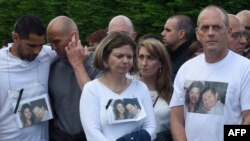It wasn’t the deadliest attack in Europe linked to the Islamic State group, but it was among the most disturbing: One evening in 2016, an assailant killed two police officers in their family home, in front of their 3-year-old son.
On Monday, a trial opened in a French counterterrorism court over the attack in the Paris suburb of Magnanville.
The attacker, Larossi Abballa, was shot to death by police. According to court documents, he told police negotiators that he was responding to an IS leader’s call to “kill miscreants at home with their families.”
A childhood friend of Abballa’s, Mohamed Aberouz, is on trial for complicity to terrorism-related murder, complicity to kidnapping and terrorist conspiracy. Aberouz, who says he is innocent, faces up to life in prison if convicted.
The killings came amid a wave of attacks in France linked to the Islamic State group and had a lasting effect on police officers around France. Some moved, changed services or resigned to protect their loved ones after the Magnanville killings.
“All of us are watching this trial,” Denis Jacob, general secretary of the police union Alternative Police Nationale, said on BFM television as the trial began.
According to court documents, Abballa broke into the home of police officers Jessica Schneider and Jean-Baptiste Salvaing before they returned from work. When Schneider came home, Abballa slit her throat in the living room, with the child present.
Salvaing texted her from the office to say, “I’m leaving,” documents say.
There was no response. He was stabbed upon arriving home.
Neighbors called police and the attacker said he was holding the couple’s 3-year-old hostage, according to the documents. He told a negotiator from a special police unit that he acted because the French government was preventing the faithful from joining the caliphate and stressed that he had not targeted civilians but representatives of the French state.
Police stormed the home, killed Abballa and rescued the child. The boy, now 10, has been raised by family members since, and is not expected to appear at the trial.
After more than five years of investigation and multiple arrests, only Aberouz is facing trial. Charges were initially brought against two others but later dropped.
Aberouz, now 30, was arrested a year after the events, when his DNA was found on the victims’ computer.
Taking the stand at the start of Monday's trial, he told the court, “I want to express all my compassion for the families of victims,” according to public broadcaster France-Info. He condemned Abballa's actions and insisted on his own innocence. “I hope to be listened to” during the trial, he said.
Aberouz initially disputed connections to IS, before acknowledging that the group corresponded to his convictions while denouncing its extremist methods, according to the court documents.
He maintains that he never went to the police couple’s home or helped in preparing the attack. He said the DNA found in the victims’ home could have been the result of his shaking hands with Abballa or riding in his car in the days before the attack.
Aberouz’s lawyer, Vincent Brengarth, said he would plead for acquittal. “There is no message in which he talks about an attack,” he told The Associated Press.
Aberouz was already sentenced to prison in another terrorism case, for his role in a failed gas canister attack near Notre Dame Cathedral in Paris.
Police hope that the Magnanville attack trial sheds light on the preparations for the attack and the methods used by those who plot to attack police officers.
A verdict is expected Oct. 10.





